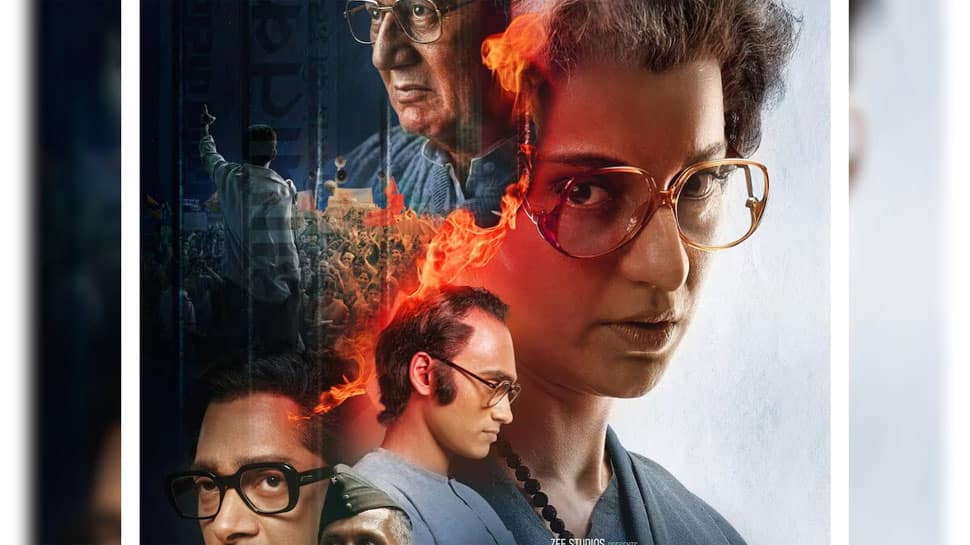Director: Kangana Ranaut
Cast: Kangana Ranaut, Anupam Kher, Shreyas Talpade, Visakh Nair, Mahima Chaudhary, Milind Soman, Satish Kaushik
Duration: 2 hours 28 minutes
Rating: 3.5
Kangana Ranaut’s Emergency is a courageous and complex film that delves into one of the most controversial and politically charged chapters of India’s history. Set against the backdrop of the Emergency from 1975 to 1977, when Prime Minister Indira Gandhi suspended civil liberties and banned dissent, the film not only narrates the events but also deals with the price of electricity and its Also offers a raw, personal exploration. consequences. Both the director and the lead actress, Kangana Ranaut, have taken an ambitious leap by playing the role of a strong-willed leader and have woven a story that is as complex as the political landscape.
At the center of Emergency is Kangana Ranaut’s impeccable portrayal of Indira Gandhi. Rather than focus solely on the formidable personality of the political icon, Kangana brings to life the woman behind the leader – the emotional turmoil, moral dilemmas and contradictions that defined Gandhi’s leadership. It’s a performance marked by depth, strength and vulnerability, one that makes Gandhi feel both distant and deeply relatable. From the political chessboard to the moments of personal reflection, Kangana captures the complexities of her character, portraying a woman torn between ambition and the heavy cost of her decisions.
What really adds to the emergency is Kangana’s careful direction. She avoids the trap of merely condemning or glorifying the controversial Prime Minister, instead offering a nuanced perspective on the dynamics of power and authority. She allows the film to unfold with patience, delving deeply into the relationships that shaped that period, particularly the strained relationship between Indira and her son, Sanjay Gandhi. Visakh Nair’s portrayal of Sanjay adds another layer to the story, as the character’s youthful exuberance and dangerous ideals create both conflict and tragedy within the story. Their power struggle becomes the emotional center of the film, providing insight into the personal cost of political ambition.
Apart from the excellent central performances, the supporting cast of Emergencies further strengthens the narrative. Anupam Kher brings moral clarity and conviction to the role of the tireless opposition leader, Jayaprakash Narayan. His conversation with Gandhi creates a balanced tension, offering a much-needed counterpoint to his authoritarian rule. Satish Kaushik as Jagjivan Ram, Milind Soman as Sam Manekshaw and Mahima Chaudhary as Pupul Jayakar add complexity to the film, providing a comprehensive understanding of the political forces operating during the Emergency.
Kangana’s approach towards the material is both adventurous and measured. Although she does not shy away from depicting controversial aspects of Gandhi’s rule, including the forced sterilization campaign and the crackdown on dissent, she presents these moments with a sense of restraint. This restraint prevents the film from turning into political propaganda, instead offering a layered and thoughtful commentary on the nature of governance, the use of power, and the consequences of leadership. Kangana’s subtle pacing ensures that each scene builds tension and allows the characters to develop in a way that feels authentic to the time period.
Visually, the Emergency is a triumph. The cinematography beautifully captures the essence of 1970s India, from the bustling streets of Delhi to the tense political corridors of power. Period-specific details – from costumes to set design – immerse audiences in the era, keeping the political drama grounded in reality. Lighting, especially during moments of political confrontation, adds a layer of mystery and urgency, increasing the stakes of every decision.
The music of the film also plays an important role in strengthening its theme. Songs like Sinhasan Khaali Karo and Sarkar Ko Salaam Hai reflect the socio-political unrest of the period, while the background score intensifies the emotional gravity of the narrative. The soundtrack is not merely a backdrop to the drama – it serves as a thematic device that helps enhance the film’s commentary on power and control.
Ultimately, Emergency is a film that does more than narrate a historical event; It challenges the audience to think about power, its moral implications, and the impact it has on those who wield it. Kangana Ranaut has crafted not just a compelling political drama but a deeply human story about leadership and its consequences. With stellar acting, a bold directorial vision and a nuanced understanding of its subject, Emergency is a must-watch film for anyone wishing to understand the complexities of power and the political legacies that have shaped modern India.
Kangana Ranaut’s Emergency is a rare film that doesn’t just entertain – it provokes, challenges and forces us to consider the nature of governance and the personal costs of political leadership. It’s a fitting testament to Kangana’s skills as both a director and an actress, proving that she is not only capable of playing iconic roles, but also capable of shaping cinema in ways that challenge traditional narratives. Are.
